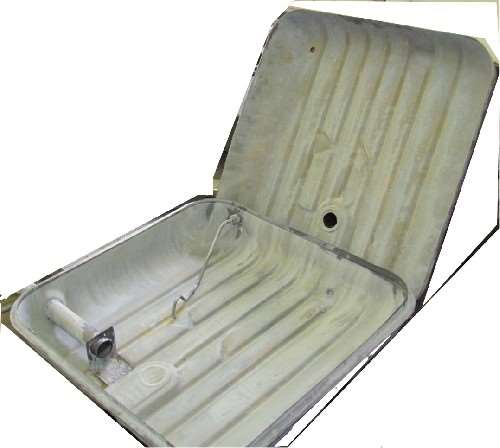|
Re: Need advice on cleaning out my gas tank
|
||||
|---|---|---|---|---|
|
Home away from home

|
Gas tank sealer has been on the market for 50 years and millions have used it with no trouble. To clean the tank take a 2 ft length of chain and tie a string to the end of it. Lower it into the tank and anchor the string to a piece of wood or a long wrench. Put several gallons of hot water in the tank and with a buddy shake it violently.
Remove the chain, drain and flush with a qt. of rubbing alcohol to absorb the water. The sealer not only seals pinholes but seals any remaining particles to the inside surface of the tank. Happy Motoring
Posted on: 2017/6/6 14:38
|
|||
|
||||
|
Re: Need advice on cleaning out my gas tank
|
||||
|---|---|---|---|---|
|
Forum Ambassador
|
Photo of 51-56 fuel tank inner construction courtesy of Ross.
Posted on: 2017/6/6 15:21
|
|||
|
Howard
|
||||
|
||||
|
Re: Need advice on cleaning out my gas tank
|
||||
|---|---|---|---|---|
|
Home away from home
|
Leaving it uncoated is not really an option as it will rust so fast it will make your head spin. The coatings work just fine and I have had them in various tanks for years.
Lately I just let my local radiator man do them for me. He has a wonderful process for tanks that have a lot of accumulated varnish in them. It is almost impossible to wash out a large deposit with thinners. He has the tanks baked at high temperature at a heat treating facility. The varnish turns to something like charcoal which he can then remove. I took him a 48 Stude tank with something like an inch of varnish goo on the bottom. Afterwards he gave me back a cardboard box full of the residue. After baking he has to resolder any connections that melted loose and then recoats the tank inside and out. It makes a beautiful and very sound job.
Posted on: 2017/6/7 5:19
|
|||
|
||||
|
Re: Need advice on cleaning out my gas tank
|
||||
|---|---|---|---|---|
|
Just popping in
|
Thanks for the replies and the helpful advice. Here's what I've done. I continued to blow air, from my compressor, into all the openings and from different angles. I also had the shop vac nozzle stuck in the filler neck as I was blowing air in. I continued this until there was no more, or very little, brown dust blowing out. Then I put a short piece of chain into the tank and swished it around, concentrating on scraping the top clean by turning the tank upside down as I swished it around. Then I went back to blowing air in again. Then I mixed up a strong solution of a Melaleuca product called "Tub & Tile". It's a citrus based cleaner that cleans rust stains from sinks and tubs. At full undiluted strength you can soak a dirty old penny in this stuff for a while and it will come out looking shiny like new, so I figured it should work to clean up what ever rust dust was left in the tank. After flushing it out several times, it now looks really good. It isn't bare metal, but it's a gray color, similar to the picture in the above posting. I can see the pickup tube and it also is gray with no rust. I may have gotten very lucky here. I've decided to go ahead and use the tank as is, and add an inline filter. At least until new replacements are once again available from Kanter. Thanks again guys for the replies. Nice talking with you Howard, take care. I'll post again with an update after I get back from the Good Guys car show in Des Moines Iowa at the end of the month. That's going to be about an 800 mile round trip.
Tim
Posted on: 2017/6/7 8:53
|
|||
|
Tim,
1951 Packard 300 Ultramatic 1954 Pontiac Starchief 1947 Ford 2 door sedan 1962 Ford F100 unibody 1952 Ford F5 farm truck |
||||
|
||||
|
Re: Need advice on cleaning out my gas tank
|
||||
|---|---|---|---|---|
|
Forum Ambassador

|
I hope your tank lasts until you can get a replacement.
Historically, metal gas tanks were constructed of "terne plate", steel sheet coated with an alloy of lead, tin and antimony to make an inexpensive corrosion-resistant material. Various pressures over time, primarily environmental, health and cost, have changed the nature of the alloy coating to zinc and tin and more recently to primarily tin. Nevertheless once corrosion and/or mechanical forces have stripped this metal coating, you are down to naked steel and as Ross indicates, it will commence rusting VERY quickly.
Posted on: 2017/6/7 9:21
|
|||
|
||||

 (54.74 KB)
(54.74 KB)






